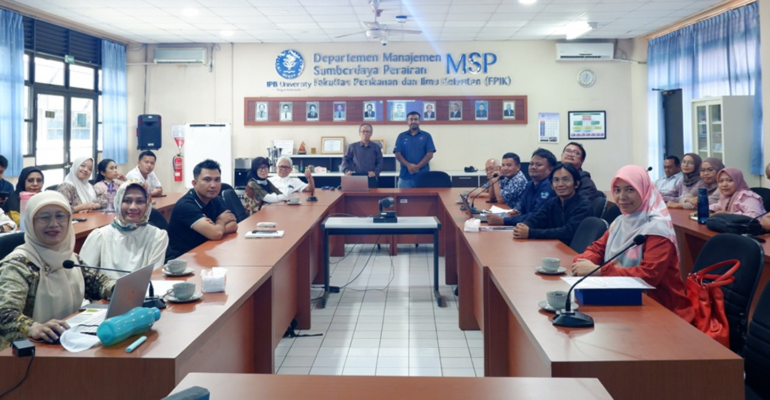IPB University’s MSP Department Invites UMT Bioecologists to Expose Marine Biota Species Transgression

The Department of Aquatic Resource Management (MSP), Faculty of Fisheries and Marine Science (FPIK) IPB University in collaboration with the Maritime, Marine and Fisheries International Research Institute (LRI i-MAR) presented a guest lecture from Universiti Malaysia Terengganu (UMT) to explain the importance of research and conservation of marine biota species in Indonesia using spatial data-based transgression methods.
Dr Bryan Raveen Nelson, a bioecologist from UMT, explained important strategies in using satellite and spatial data to understand marine species transgression. He also emphasized the importance of understanding the adaptation of marine species and the dynamics of marine ecosystems in the face of environmental changes, such as sea level rise.
Dr Nelson delivered a strategic lecture focusing on the use of satellite and spatial data to gain insight into the events that lead to the transgression of marine biota species. The lecture aimed to highlight the potential of advanced technologies in monitoring and analyzing the impacts of environmental change on marine ecosystems.
The lecture began with an introduction to the Institute for Tropical Biodiversity & Sustainable Development (IBTPL) at UMT, an organization dedicated to conserving and managing tropical ecosystems. This introduction established the importance of understanding the transgression of marine life species in tropical ecosystems that are highly vulnerable to climate change and human activities.
The General Lecture also discussed the potential for collaboration on an initiative project proposal that aims to strengthen academic connections between higher education institutions in Europe and Southeast Asia (ASEAN). This collaboration is part of the European Community (EU) – ASEAN Sustainability Connectivity Package.
“This collaboration aims to enhance cooperation and knowledge sharing between European and Southeast Asian institutions. In addition, it is also to promote the development of sustainability, including marine biodiversity conservation, through joint research initiatives,” said Prof Hefni Effendi as the Chairman of the MSP Department.
Indonesia, with its vast marine biodiversity, has great potential for marine biota species transgression research. However, the baseline data needed to support such research is often lacking. Therefore, Dr Nelson emphasized the importance of comprehensive baseline data to monitor and predict the impact of environmental change on marine life species in Indonesian waters.
The general lecture moderated by Dr Majariani Krisanti (MSP Lecturer) and opened by the Dean of FPIK, Prof Fredinan Yulianda, was attended not only offline by IPB University Postgraduate students (S2 and S3) from the Aquatic Resource Management Study Program (SDP) and Coastal and Marine Resource Management Study Program (SPL), but also attended by a number of online enthusiasts. (*/Rz) (IAAS/ZQA)



